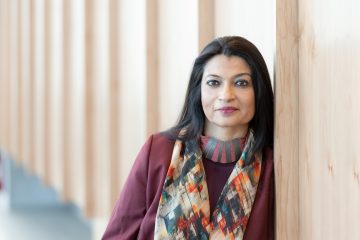This International Women’s Day 2021, we decided to connect with inspiring women championing inclusion at UBC to hear their reflections on this day and perspectives on a more equitable and inclusive future.

Provost and Vice-President Academic, University of British Columbia (UBC) Okanagan
Co-executive lead for Anti-racism, UBC
Professor, Department of Economics, Philosophy and Political Science
What does IWD mean to you?
It serves as a reminder of the invincibility of the human spirit.
Can you tells us a little bit about your leadership role as the Provost and Vice-President Academic?
As Provost my mandate is to advance the mission of the university which is to “pursue excellence in research, learning and engagement to foster global citizenship and advance a sustainable and just society across British Columbia, Canada and the world”. As a key member of the leadership team of UBC Okanagan, my priority is the implementation of Outlook 2040, a bold vision for academic excellence, global recognition and social inclusion, including the campus’ response to the Truth and Reconciliation Commission’s Calls to Action.
President Ono has recently appointed me and Ainsley Carry, VP Students, as executive co-leads for UBC’s anti-racism initiatives. I am deeply humbled by this appointment.
The recent discussions on systemic injustice have challenged universities to look at how we operate as institutions, how we teach, how we serve the next generation and how we conduct research. Being in a provost role in a leading university gives me a space that is very valuable to me. I am keen to seize this space and create a sense of possibility, hope and empowerment amongst those who feel they cannot realize their potential because of their identity and/or socio-economic standing.
I see a lot of hope in our students. I really admire the younger generation in the way they are taking up these issues. They’re bold, vocalizing their difficult lived experience, demanding change, articulating where the gaps are. Being vocal is difficult. It requires us to make ourselves vulnerable. But they are doing it consistently, helping all of us to find our voices and tell our stories.
My hope is to use the space I have to support this momentum for transformative change.
You have gained so many vast and diverse experiences over time. What is the one piece of advice you’d like to leave our audience with?
We are always fighting a contradiction between our inner voices, which asks us to be bold, and the voice of society at large, which tells us to be cautious.
This is a struggle a lot of people – particularly those who face systemic barriers – have. And I’ve learned that it cannot be resolved. The first thing is to acknowledge that it’s not going to go away. Seek out people who understand you, who support you and who can tell you how to confront challenges as they arise. But every time you find a way forward, you become stronger as a person, even if that sometimes means that you have “lost” in some way. That only prepares you for a tougher fight the next time.
What is the one idea you want to challenge this IWD?
I want to challenge the idea that inequality “just happens’. Inequality in all its forms is made by us and therefore can be unmade.
Please share a self-care tip with our readers.
Speak. Our voice matters.